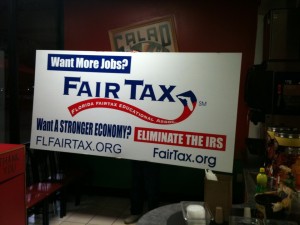This is good news. A small step forward. But it is a step forward. It brings the FairTax to a place in the legislative process that it has never been before. Many thanks sponsors Chambliss and Woodall and to the thousands of FairTax advocates throughout the country. Our work is finally beginning to pay off. Emphasis on beginning.
For Immediate Release:
Chambliss, Woodall Call for FairTax Consideration
Send letter to Joint Committee on Taxation
WASHINGTON- Today, U.S. Sen. Saxby Chambliss, R-Ga., and U.S. Rep. Rob Woodall, R-Ga-7, asked the Joint Committee on Taxation to produce a revenue estimate of H.R. 25 and S. 13, the FairTax bill. This estimate will allow the FairTax to be considered during congressional negotiations for tax reform.
Chambliss and Woodall have long urged Congress to support the FairTax legislation, which would implement a simpler, less-cumbersome tax code. Chambliss and Woodall have sponsored legislation in both the House and the Senate.
“The current tax code has become too burdensome and complex, and is filled with provisions that benefit only a few Americans at the expense of everyone else. That’s simply not right,” said Chambliss. “Now is the time to enact the FairTax, which would create a fairer, simpler tax code that allows every American the freedom to determine his or her own priorities and opportunities.”
“No matter what they do, honest, hardworking Americans are punished under our current tax code. Pass the FairTax, and we can unshackle America’s job creators and jump start this economy. Pass the FairTax, and we can reward all Americans who contribute to our economy—not just those who can afford the best tax lawyers and accountants,” Woodall said. “We, as a nation, can do better than relying on a tax code that picks winners and losers. Let’s level the playing field with the FairTax and restore more freedom to our economy, not more government.”
The FairTax would shift the federal government’s method of revenue collection from income to personal consumption. It would repeal all federal personal income taxes, corporate income taxes, payroll taxes, self-employment taxes, capital gains taxes and gift and estate taxes, and would replace those with a revenue-neutral, personal consumption tax on all retail sales of new goods and services.
Text of the letter is below: Continue reading Chambliss, Woodall Advance FairTax Legislation
